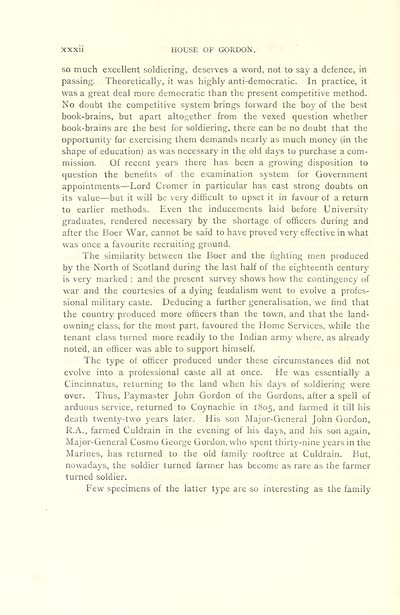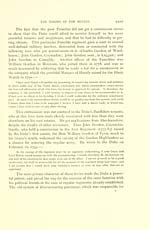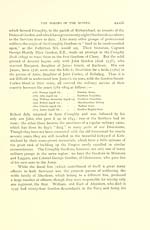New Spalding Club > House of Gordon > Gordons under arms
(42) Page xxxii
Download files
Complete book:
Individual page:
Thumbnail gallery: Grid view | List view

XXXli HOUSE OF GORDON.
SO much excellent soldiering, deserves a word, not to say a defence, in
passing. Theoretically, it was highly anti-democratic. In practice, it
was a great deal more democratic than the present competitive method.
No doubt the competitive system brings forward the boy of the best
book-brains, but apart altogether from the vexed question whether
book-brains are the best for soldiering, there can be no doubt that the
opportunity for exercising them demands nearly as much money (in the
shape of education) as was necessary in the old days to purchase a com-
mission. Of recent years there has been a growing disposition to
question the benefits of the examination system for Government
appointments — Lord Cromer in particular has cast strong doubts on
its value — but it will be very difficult to upset it in favour of a return
to earlier methods. Even the inducements laid before University
graduates, rendered necessary by the shortage of officers during and
after the Boer War, cannot be said to have proved very effective in what
was once a favourite recruiting ground.
The similarity between the Boer and the fighting men produced
by the North of Scotland during the last half of the eighteenth century
is very marked : and the present survey shows how the contingency of
war and the courtesies of a dying feudalism went to evolve a profes-
sional military caste. Deducing a further generalisation, we find that
the country produced more officers than the town, and that the land-
owning class, for the most part, favoured the Home Services, while the
tenant class turned more readily to the Indian army where, as already
noted, an officer was able to support himself.
The type of officer produced under these circumstances did not
evolve into a professional caste all at once. He was essentially a
Cincinnatus, returning to the land when his days of soldiering were
over. Thus, Paymaster John Gordon of the Gordons, after a spell of
arduous service, returned to Coynachie in 1805, and farmed it till his
death twenty-two years later. His son Major-General John Gordon,
R.A., farmed Culdrain in the evening of his days, and his son again,
Major-General Cosmo George Gordon, who spent thirty-nine years in the
Marines, has returned to the old family rooftree at Culdrain. But,
nowadays, the soldier turned farmer has become as rare as the farmer
turned soldier.
Few specimens of the latter type are so interesting as the family
SO much excellent soldiering, deserves a word, not to say a defence, in
passing. Theoretically, it was highly anti-democratic. In practice, it
was a great deal more democratic than the present competitive method.
No doubt the competitive system brings forward the boy of the best
book-brains, but apart altogether from the vexed question whether
book-brains are the best for soldiering, there can be no doubt that the
opportunity for exercising them demands nearly as much money (in the
shape of education) as was necessary in the old days to purchase a com-
mission. Of recent years there has been a growing disposition to
question the benefits of the examination system for Government
appointments — Lord Cromer in particular has cast strong doubts on
its value — but it will be very difficult to upset it in favour of a return
to earlier methods. Even the inducements laid before University
graduates, rendered necessary by the shortage of officers during and
after the Boer War, cannot be said to have proved very effective in what
was once a favourite recruiting ground.
The similarity between the Boer and the fighting men produced
by the North of Scotland during the last half of the eighteenth century
is very marked : and the present survey shows how the contingency of
war and the courtesies of a dying feudalism went to evolve a profes-
sional military caste. Deducing a further generalisation, we find that
the country produced more officers than the town, and that the land-
owning class, for the most part, favoured the Home Services, while the
tenant class turned more readily to the Indian army where, as already
noted, an officer was able to support himself.
The type of officer produced under these circumstances did not
evolve into a professional caste all at once. He was essentially a
Cincinnatus, returning to the land when his days of soldiering were
over. Thus, Paymaster John Gordon of the Gordons, after a spell of
arduous service, returned to Coynachie in 1805, and farmed it till his
death twenty-two years later. His son Major-General John Gordon,
R.A., farmed Culdrain in the evening of his days, and his son again,
Major-General Cosmo George Gordon, who spent thirty-nine years in the
Marines, has returned to the old family rooftree at Culdrain. But,
nowadays, the soldier turned farmer has become as rare as the farmer
turned soldier.
Few specimens of the latter type are so interesting as the family
Set display mode to: Large image | Transcription
Images and transcriptions on this page, including medium image downloads, may be used under the Creative Commons Attribution 4.0 International Licence unless otherwise stated. ![]()
| Publications by Scottish clubs > New Spalding Club > House of Gordon > Gordons under arms > (42) Page xxxii |
|---|
| Permanent URL | https://digital.nls.uk/79781201 |
|---|
| Description | Volumes 47-53 are uniform with but not part of the club's series. |
|---|---|

